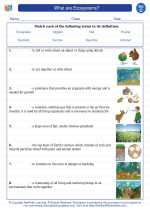Ecosystems Study Guide
What is an Ecosystem?
An ecosystem is a community of living organisms (plants, animals, and microorganisms) in conjunction with the nonliving components of their environment (such as air, water, and mineral soil), interacting as a system. These biotic and abiotic components are linked together through nutrient cycles and energy flows.
Types of Ecosystems
There are various types of ecosystems, including:
- Terrestrial Ecosystems: These include forests, grasslands, deserts, and tundra.
- Aquatic Ecosystems: These include freshwater (lakes, rivers) and marine (oceans, coral reefs) ecosystems.
Components of an Ecosystem
An ecosystem consists of:
- Abiotic Factors: Non-living components such as sunlight, water, soil, and air.
- Biotic Factors: Living organisms, including producers (plants), consumers (animals), and decomposers (microorganisms).
Energy Flow in Ecosystems
Energy flows through an ecosystem in a one-way direction, typically from the sun to producers, then to consumers, and finally to decomposers. This flow is represented in a food chain or food web.
Ecological Relationships
Within an ecosystem, organisms have various ecological relationships, including:
- Competition: Organisms competing for limited resources.
- Predation: The act of one organism consuming another for food.
- Symbiosis: Close and long-term interactions between different species, including mutualism, commensalism, and parasitism.
Human Impact on Ecosystems
Human activities, such as deforestation, pollution, and overfishing, can disrupt and degrade ecosystems, leading to biodiversity loss and environmental problems.
Conservation of Ecosystems
Conservation efforts aim to protect and restore ecosystems, preserving biodiversity and maintaining the balance of natural systems for future generations.
Conclusion
Understanding ecosystems is crucial for appreciating the interconnectedness of life on Earth and for promoting sustainable practices that safeguard our environment.
[Ecosystems] Related Worksheets and Study Guides:
.◂Science Worksheets and Study Guides Third Grade. What are Ecosystems?
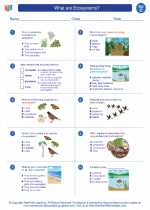
 Worksheet/Answer key
Worksheet/Answer key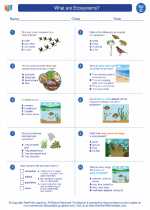
 Vocabulary/Answer key
Vocabulary/Answer key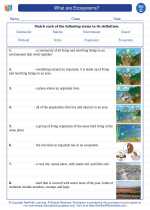
 Vocabulary/Answer key
Vocabulary/Answer key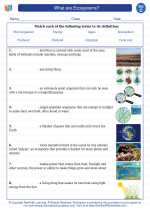
 Vocabulary/Answer key
Vocabulary/Answer key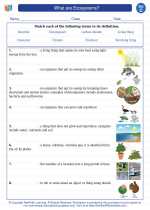
 Vocabulary/Answer key
Vocabulary/Answer key